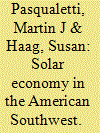|
|
|
Sort Order |
|
|
|
Items / Page
|
|
|
|
|
|
|
| Srl | Item |
| 1 |
ID:
087210


|
|
|
|
|
| Publication |
London, Routledge, 1990.
|
| Description |
xvii, 237p.
|
| Standard Number |
9780415034807
|
|
|
|
|
|
|
|
|
|
|
|
Copies: C:1/I:0,R:0,Q:0
Circulation
| Accession# | Call# | Current Location | Status | Policy | Location |
| 032742 | 333.7924/PAS 032742 | Main | On Shelf | General | |
|
|
|
|
| 2 |
ID:
109701


|
|
|
|
|
| Publication |
2011.
|
| Summary/Abstract |
Energy and water are interlinked. The development, use, and waste generated by demand for both resources drive global change. Managing them in tandem offers potential for global-change adaptation but presents institutional challenges. This paper advances understanding of the water-energy nexus by demonstrating how these resources are coupled at multiple scales, and by uncovering institutional opportunities and impediments to joint decision-making. Three water-energy nexus cases in the United States are examined: (1) water and energy development in the water-scarce Southwest; (2) conflicts between coal development, environmental quality, and social impacts in the East; and (3) tensions between environmental quality and economic development of shale natural gas in the Northeast and Central U.S. These cases are related to Eastern, Central, and Western regional stakeholder priorities collected in a national effort to assess energy-water scenarios. We find that localized challenges are diminished when considered from broader perspectives, while regionally important challenges are not prioritized locally. The transportability of electricity, and to some extent raw coal and gas, makes energy more suitable than water to regionalized global-change adaptation, because many of the impacts to water availability and quality remain localized. We conclude by highlighting the need for improved coordination between water and energy policy.
|
|
|
|
|
|
|
|
|
|
|
|
|
|
|
|
| 3 |
ID:
110583


|
|
|
|
|
| Publication |
2011.
|
| Summary/Abstract |
Like many other sub-tropical deserts in the world, the southwestern U.S. has high rates of solar insolation. However, meaningful development there, especially in solar-rich Arizona, has been slow. This article addresses why this is so by concentrating on one critical contributor to success-workforce development. To identify shortcomings and needed changes, we used a survey of the significant solar firms operating in Arizona to ask three questions: Does a gap exist between existing and desired levels of solar engineering education and training? What skills should new graduates possess when entering the solar energy workforce? What course of study is considered important in the education of solar energy employees? We found that a stronger solar economy in Arizona will not depend, at least initially, on advanced graduate training in engineering, but on a broad-based Bachelor's level degree program that complements engineering studies with a strong emphasis on verbal and written communication, as well as business and teaming abilities. Non-technical skills and project management are at least as valuable as solar training. Given the high public awareness of Arizona's solar resource, a stronger solar future there should help stimulate similar progress elsewhere, both in the U.S. and abroad.
|
|
|
|
|
|
|
|
|
|
|
|
|
|
|
|
|
|
|
|
|